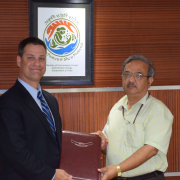
The U.S. Agency for International Development (USAID) announced five new partnerships, four of which are with the Government of India, to expand U.S.-India cooperation on clean energy, environment and climate change. USAID Assistant Administrator for Asia, Mr. Jonathan Stivers, was in Delhi to represent the U.S. development agency at the second U.S.-India Strategic and Commercial Dialogue.
Ambassador Jonathan Addleton, Mission Director to India, U.S. Agency for International Development (USAID), and Dr. Nutan Mundeja, Project Director of the AAMC 100, today inaugurated an automated Medicine Vending Machine (MVM) at the Aam Aadmi Mohalla Clinic in Rajender Nagar, New Delhi. A first of its kind in the country, the vending machine is a mini-medicine shop that can store and dispense up to 50 different types of prescribed medicines, including tablets and bottles.
As you know, India and the United States have a long and successful partnership in the energy sector that has grown stronger and deeper under the leadership of Prime Minister Modi and President Obama. It’s a testament to our common interest that our leaders have visited one another seven times over the past 20 months – and where clean energy and climate change were always a key component of their talks. As I have been telling people for many months, our work together on climate and clean energy may be the single biggest pathway of US/India cooperation in the years ahead.
U.S. Ambassador to India Richard R. Verma visited the Sai Hospital in Mumbai’s Dharavi slum yesterday to learn about the U.S. Agency for International Development (USAID)’s support to test and diagnose HIV in patients suffering from tuberculosis (TB), and to demonstrate the U.S. commitment to fight TB and HIV in India. In India, approximately 50 percent of deaths in HIV patients are due to TB, reinforcing the need to prevent, care and treat HIV and TB as co-infections. During Ambassador Verma’s visit, he met with doctors, local health care workers, and patients to discuss the magnitude of TB and HIV’s burden among the vulnerable poor in India.
The U.S. Agency for International Development (USAID) and India’s National Smart Grid Mission (NSGM) launched today the first in a series of training programs aimed at building the capacity and skills of utility personnel to develop India’s Smart Grid infrastructure. This training will help the Government of India achieve its target of having 10 percent of personnel from 14 of India’s state utilities trained in Smart Grid functions.








Comment
Make a general inquiry or suggest an improvement.